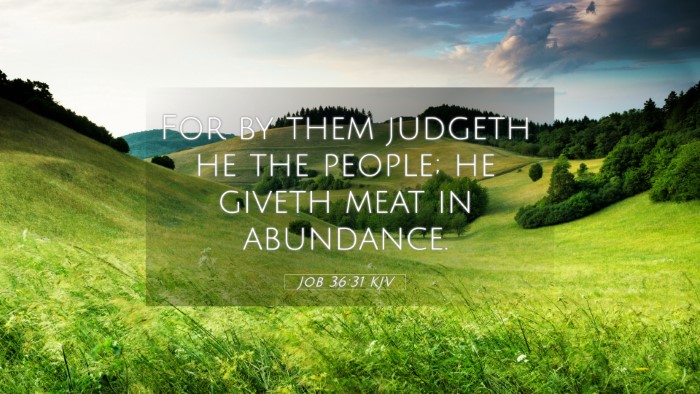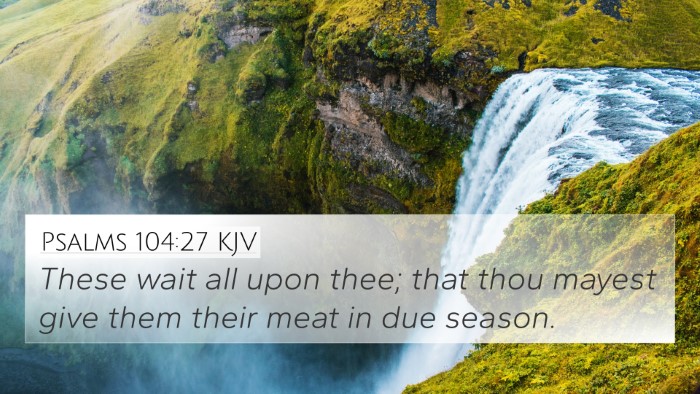Understanding Job 36:31
Job 36:31 states, "For by them judgeth he the people; he giveth meat in abundance."
This verse speaks to God's sovereignty and His providential care for humanity, emphasizing His role as a judge and provider. To fully comprehend the depth of this scripture, we explore insights from prominent public domain commentaries.
Insights from Commentaries
-
Matthew Henry:
Henry highlights that God’s judgments serve to correct and to provide for His people. The abundance of provision is a reflection of His grace and how His power manifests in the world.
-
Albert Barnes:
Barnes notes that God's governance of nations is evident through the distribution of sustenance. The verse is a reminder of the divine authority exercised over both natural and moral order.
-
Adam Clarke:
Clarke elaborates on the dual aspect of God's dealings with people. He interprets 'judgeth' in terms of guidance and provision, pointing to God’s responsibility in the sustenance of life.
Thematic Connections in the Scripture
The verse sets the stage for a deeper examination of God's relationship with His creation. Understanding Job 36:31 calls for cross-referencing with other biblical texts to draw connections and insights. Below are key cross-references relevant to this verse:
- Psalm 136:25: "Who giveth food to all flesh: for his mercy endureth forever." - Emphasizes God's provision of sustenance.
- Matthew 5:45: "For he maketh his sun to rise on the evil and on the good, and sendeth rain on the just and on the unjust." - Illustrates God's impartial care.
- Philippians 4:19: "But my God shall supply all your need according to his riches in glory by Christ Jesus." - Affirms God's provision in Christ.
- Isaiah 55:10-11: "For as the rain cometh down, and the snow from heaven, and returneth not thither, but watereth the earth..." - Highlights divine providence and the effectiveness of God's word.
- 2 Corinthians 9:10: "Now he that ministereth seed to the sower both minister bread for your food, and multiply your seed sown..." - Relates to God’s role as provider.
- Deuteronomy 8:3: "And he humbled thee, and suffered thee to hunger, and fed thee with manna, which thou knewest not..." - Reminds of God's provision in times of need.
- John 6:35: "And Jesus said unto them, I am the bread of life: he that cometh to me shall never hunger..." - Jesus as the ultimate sustainer of life.
Cross-Referenced Themes
The themes present in Job 36:31 resonate through the entirety of scripture, revealing several patterns:
- **Divine Judgment and Sovereignty:** God's authority over creation and His active role in guiding nations.
- **Provision and Abundance:** God's care in supplying needs, seen both physically (food) and spiritually (spiritual sustenance).
- **Mercy and Grace:** The constant reminder of God's willingness to provide, despite human unworthiness.
Practical Application and Reflection
This verse, coupled with its cross-references, leads to practical applications in daily life. Believers are encouraged to trust in God as the supreme judge and provider. It invites reflection on personal reliance on God's provision in times of want.
Exploring Connections Across Scripture
Cross-referencing allows us to see the unity of the biblical narrative, where themes of judgment, provision, and divine care emerge consistently. By employing tools for Bible cross-referencing, such as concordances and reference guides, individuals can deepen their understanding of inter-Biblical dialogue.
Conclusion
Job 36:31 serves not only as a statement of fact about God’s nature but also as a gateway to profound exploration through scriptural cross-referencing. The connections established illuminate our understanding of God as both sovereign judge and gracious provider.




















